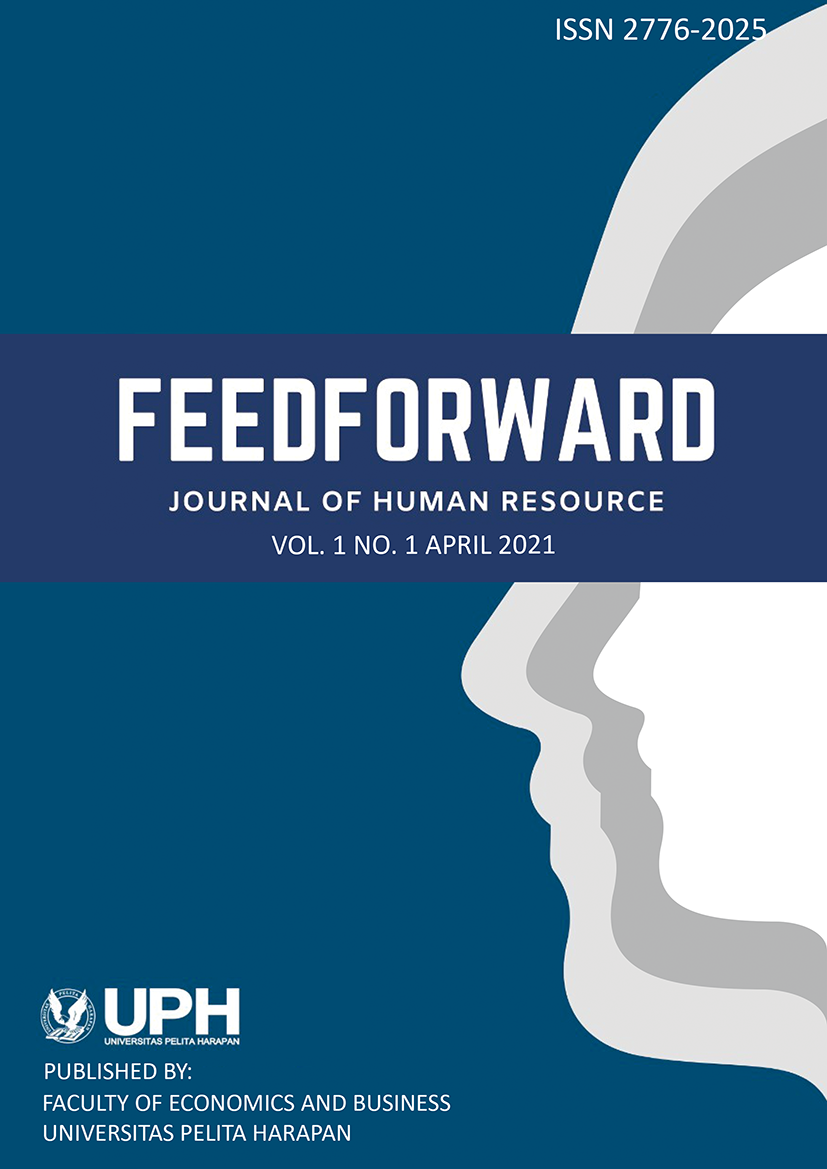Talent Management Literature Review
DOI:
https://doi.org/10.19166/ff.v1i1.3804Keywords:
talent, talent management, employee retentionAbstract
The concept of talent management has attracted most of the researchers’ attention in the recent years. In today’s business environment, talent management becomes one important source of competitive advantage that creates value for all companies. In the current economic downturn, there is a high demand for talent in the organizations. The aim of this study is to examine talent management process in organizations. This article is based on a review of the academic and popular talent management literatures. The paper focused by clarifying the definitions and the importance of talent management and what factors influencing the growth of talent management.
References
Aina, R. Al, & Atan, T. (2020). The impact of implementing talent management practices on sustainable organizational performance. Sustainability, 12(20), 1-21. https://doi.org/10.3390/su12208372
Baqutayan, S. M. S. (2014). Is talent management important? An overview of talent management and the way to optimize employee performance. Mediterranean Journal of Social Sciences, 5(23), 2290-2295. https://doi.org/10.5901/mjss.2014.v5n23p2290
Beardwell, J., & Thompson, A. (2017). Human resource management. Pearson.
Beechler, S., & Woodward, I. C. (2009). The global “war for talent.” Journal of International Management, 15(3), 273-285. https://doi.org/10.1016/j.intman.2009.01.002
Cappelli, P. (2008). Talent management for the twenty-first century. Harvard Business Review, 86(3).
Chuai, X., Preece, D., & Iles, P. (2008). Is talent management just “old wine in new bottles”?: The case of multinational companies in Beijing. Management Research News, 31(12), 901-911. https://doi.org/10.1108/01409170810920611
Collings, D. G., & Mellahi, K. (2009). Strategic talent management: A review and research agenda. Human Resource Management Review, 19(4), 304-313. https://doi.org/10.1016/j.hrmr.2009.04.001
Dries, N. (2013). The psychology of talent management: A review and research agenda. Human Resource Management Review, 23(4), 272-285. https://doi.org/10.1016/j.hrmr.2013.05.001
Gallardo-Gallardo, E., Dries, N., & González-Cruz, T. F. (2013). What is the meaning of “talent” in the world of work? Human Resource Management Review, 23(4), 290-300. https://doi.org/10.1016/j.hrmr.2013.05.002
Hughes, J. C., & Rog, E. (2008). Talent management: A strategy for improving employee recruitment, retention and engagement within hospitality organizations. International Journal of Contemporary Hospitality Management, 20(7), 743-757. https://doi.org/10.1108/09596110810899086
Kamel, N. (2019). Implementing talent management and its effect on employee engagement and organizational performance. Abu Dhabi International Petroleum Exhibition & Conference, Abu Dhabi, UAE, November 2019. https://doi.org/10.2118/197665-MS
Lewis, R. E., & Heckman, R. J. (2006). Talent management: A critical review. Human Resource Management Review, 16(2), 139-154. https://doi.org/10.1016/j.hrmr.2006.03.001
Morton, L. (2005). Talent management value imperatives: Strategies for successful execution [Research Report R-1360-05-RR]. Conference Board.
Narayanan, A., Rajithakumar, S., & Menon, M. (2019). Talent management and employee retention: An integrative research framework. Human Resource Development Review, 18(2), 228-247. https://doi.org/10.1177/1534484318812159
Nilsson, S., & Ellström, P. (2012). Employability and talent management: Challenges for HRD practices. European Journal of Training and Development, 36(1), 26-45. https://doi.org/10.1108/03090591211192610
Ott, D. L., Tolentino, J. L., & Michailova, S. (2018). Effective talent retention approaches. Human Resource Management International Digest, 26(7). https://doi.org/10.1108/HRMID-07-2018-0152
Poorhosseinzadeh, M., & Subramaniam, I. D. (2011). Trust management: Literature review. Management, 6(4), 315-331.
Schiemann, W. A. (2014). From talent management to talent optimization. Journal of World Business, 49(2), 281-288. https://doi.org/10.1016/j.jwb.2013.11.012
Schuler, R. S., Jackson, S. E., & Tarique, I. (2011). Global talent management and global talent challenges: Strategic opportunities for IHRM. Journal of World Business, 46(4), 506-516. https://doi.org/10.1016/j.jwb.2010.10.011
Shafieian, G. (2014). Defining talent management components. Advanced Computational Techniques in Electromagnetics, 1-7. https://doi.org/10.5899/2014/acte-00182
Son, J., Park, O., Bae, J., & Ok, C. (2020). Double-edged effect of talent management on organizational performance: The moderating role of HRM investments. International Journal of Human Resource Management, 31(17), 2188-2216. https://doi.org/10.1080/09585192.2018.1443955
Sparrow, P. R., & Makram, H. (2015). What is the value of talent management? Building value-driven processes within a talent management architecture. Human Resource Management Review, 25(3), 249-263. https://doi.org/10.1016/j.hrmr.2015.04.002
Vaiman, V., Haslberger, A., & Vance, C. M. (2015). Recognizing the important role of self-initiated expatriates in effective global talent management. Human Resource Management Review, 25(3), 280-286. https://doi.org/10.1016/j.hrmr.2015.04.004
Vaiman, V., Scullion, H., & Collings, D. (2012). Talent management decision making. Management Decision, 50(5), 925-941. https://doi.org/10.1108/00251741211227663
Wellins, R. S., Smith, A. B., & Erker, S. (2008). White Paper - Nine best for effective talent management. Development Dimensions International, Inc.
Downloads
Published
Issue
Section
License
Authors who publish with this journal agree to the following terms:
1) Authors retain copyright and grant the journal right of first publication with the work simultaneously licensed under a Creative Commons Attribution License (CC-BY-SA 4.0) that allows others to share the work with an acknowledgement of the work's authorship and initial publication in this journal.
2) Authors are able to enter into separate, additional contractual arrangements for the non-exclusive distribution of the journal's published version of the work (e.g., post it to an institutional repository or publish it in a book), with an acknowledgement of its initial publication in this journal.
3) Authors are permitted and encouraged to post their work online (e.g., in institutional repositories or on their website). The final published PDF should be used and bibliographic details that credit the publication in this journal should be included.


